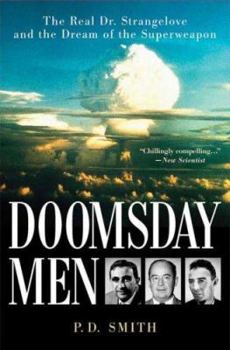Doomsday Men: The Real Dr. Strangelove and the Dream of the Superweapon
Select Format
Select Condition 
Book Overview
This is the gripping, untold story of the doomsday bomb--the ultimate weapon of mass destruction. In 1950, Hungarian-born scientist Leo Szilard made a dramatic announcement on American radio: science was on the verge of creating a doomsday bomb. For the first time in history, mankind realized that he had within his grasp a truly God-like power, the ability to destroy life itself. The shockwave from this statement reverberated across the following...
Format:Hardcover
Language:English
ISBN:031237397X
ISBN13:9780312373979
Release Date:December 2007
Publisher:St. Martin's Press
Length:553 Pages
Weight:1.90 lbs.
Dimensions:1.8" x 6.5" x 9.3"
Customer Reviews
3 ratings
Completely captivating
Published by Thriftbooks.com User , 14 years ago
Completely captivating from the first page, this book never ceases to surprise and enchant. A picturesque stroll through the interwoven history of science and fiction, I learned a lot about both while being thoroughly entertained. The cross-pollination between imagination and science has been more fruitful than I knew, and I definitely view the world differently since reading this book. Old enough to have done bomb drills in my early school days, but too young to have taken them very seriously, fear of nuclear annihilation was only on the outer fringes of my consciousness. I wonder what it would have been like to grow up entirely without such fear? I didn't know that fear of superweapons has been with us for far longer than the Cold War -- for about a century, in fact. P.D. Smith made me think about the important role this fear has played socially, politically, economically and culturally. I cannot overstate how highly I recommend this book to anyone - it is not just for geeks. Like all the best books, Doomsday Men is best devoured whole and then gone back over to be savoured slowly -- the pleasure goes on long after the first reading. Not simply a history book, it is filled with thought-provoking parallels that are entirely relevant for today. A deadly serious subject is treated with erudition and rare charm. I cannot recall any other time when my ignorance was so delightfully dispelled.
"Out of the libraries come the killers." - - Bertolt Brecht, "1940"
Published by Thriftbooks.com User , 16 years ago
In Brecht's "1940," the "latest inventions of the professors" probably didn't include the atomic bomb. Poison gas and rockets meant to kill civilians were horrific enough. But one of the surprising things (to me, at least) that P. D. Smith's Doomsday Men shows is how newspapers and popular science writing in Europe and America described atomic bombs and atomic power plants in detail decades before Hiroshima. Another interesting thing in Doomsday Men is how fiction writers and scientists inspired each other. Roentgen discovered X-rays in 1895 and the next year H. G. Wells used "Roentgen vibrations" as the rationale for the Invisible Man's experiments. (Wells was the first to use the expression "atomic bomb.") American science fiction magazines published stories about atomic energy years before Pearl Harbor. In Germany Zukunftsromane ("future novels") and Weltuntergangsromane ("end-of-the-world stories") were popular. These stories influenced German rocket scientist Wernher von Braun and Hungarian physicists Leo Szilard and Edward Teller, two of the "Hungarian Quartet" that Doomsday Men is primarily about. Most of the best nuclear scientists in Berlin were Jewish and left Germany in the 1930s for Britain or the United States. Fritz Haber, was an ultra-patriotic German-Jewish scientist who developed poison gas during World War I without any qualms. (After the Nazis took power, when Haber was a refuge in England, Ernest Rutherford refused to meet Haber, saying " 'he did not want to shake hands with the inventor of poison gas warfare.' ") Many of Haber's family were killed by Zyklon B gas at Auschwitz. As the truth about the effects of atomic bombs and atomic testing became known, a new kind of story replaced the old pro-technology-at-any-cost stories in American science fiction magazines (where you rarely read about a Faust or a Frankenstein). Actually, it was a return to an older type of story. Movies like Godzilla, Them!, The Amazing Colossal Man, and The Beast from 20,000 Fathoms were a return to the "deadly utopian dream" of turn-of-the-century fiction like H. G. Wells's The World Set Free or The War of the Worlds. By the time of the modern era of ICBMs and hotlines, the tragic figure of Goethe's Faust had become Stanley Kubrick's Dr. Strangelove, an amalgam of von Braun, Edward Teller, and others, who could only be comprehended as a joke, even though the joke was we're doomed.
An outstanding history of the cultural impact of superweapons
Published by Thriftbooks.com User , 17 years ago
Doomsday Men is an impressively creative examination of how literature and philosophy influenced the development of superweapons, and how knowledge of their ghastly potential shaped, in turn, the cultural icons of the 20th century. It shows how those involved in the Manhattan Project differed greatly in their temperments and outlooks, and reached drastically different conclusions about the role of nuclear weapons after the Second World War was over. While some scientists, such as Leo Szilard, rallied for arms control, others, such as Herman Kahn, argued that the west should be prepared to accept massive casualties. Kahn's remarks, taken to their terrifying extreme, were incorporated into Kubrick's classic dark comedy, Dr. Strangelove, a film that occupies a central place in this book. Through colorful anecdotes and fascinating connections with popular culture, Smith helps bring the turbulent history of those frightening times to life. Doomsday Men offers a vital and intruging account of the mentality and culture of the Cold War.





